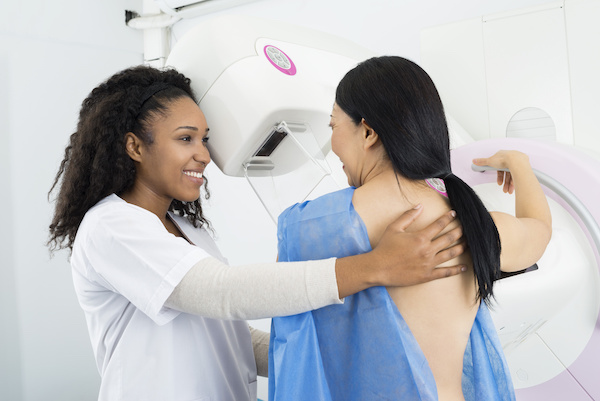October is Breast Cancer Awareness Month, so it’s an ideal time to talk about breast cancer screening. An estimated 1 in 8 women (or 12%) will develop invasive breast cancer over the course of her lifetime. To give yourself the best possible chance of survival, early detection is critical. The most reliable method for early detection is regular screening tests including self-breast exams and mammograms. Recommendations on when and how often women need mammograms depend on factors like age and risk level. If you’ve been wondering “when should I get a mammogram?” then read on to learn the guidelines.
Breast Cancer Screening Guidelines
The following recommendations from the American Cancer Society are for women at average risk for breast cancer. Meaning, she doesn’t have a personal history of breast cancer, a strong family history of breast cancer, a genetic mutation known to increase the risk of breast cancer (such as the BRCA gene), and has not had chest radiation therapy before the age of 30.
- Women ages 40 to 44 have the choice to start annual breast cancer screening with mammograms if they wish to do so.
- Women ages 45 to 54 are advised to get mammograms every year
- Women ages 55 and older have the option of switching to a mammogram every two years or continue with yearly screenings.
It is recommended that women continue regular screenings as long as she is in good health and expected to live longer than 10 or more years.
Types of Mammograms
As researchers have continued to learn more about breast cancer, new technologies have been developed to help increase the rate of early detection. So not only should you be asking “when should I get a mammogram?” you should also ask “which type of mammogram should I get?” Your OB/GYN can help give you guidance on the type of screening that’s right for you, but often they will recommend 3D mammography.
Traditional 2D mammograms take pictures of each breast from the front and the side to create a single image of each breast. Tomosynthesis, or 3D mammography, is an FDA-approved advanced technology that takes multiple images, or X-rays, of breast tissue to recreate a 3-dimensional picture of the breast compared to traditional mammography in which only a single image is obtained.
Multiple images of breast tissue slices allow radiologists to have a clearer image of breast masses, making the detection of breast cancer easier and more accurate. Additionally, this technology allows physicians to detect more cancers, reduces the risk of false positives, and makes it easier to see the cancer size compared to a regular mammogram.
What to Expect During a Mammogram
Women notice little difference between 3D mammography and a traditional 2D screening. The tube taking the X-ray sweeps across the breast in an arch taking about four seconds to obtain an image, just a little bit longer than a digital mammogram.
Because 3D mammography produces more images, it does take radiologists a little longer to read than a single digital mammography image, but the original procedure is much the same.
The whole procedure takes about 20 minutes. It is far more accurate in the early detection of breast cancer than a traditional mammogram. Your breast must be flattened to obtain a high-quality picture, which can cause discomfort.
Preparing for Your Mammogram
Now that you’ve answered “when should I get a mammogram?” now you need to know how to prepare for the screening. The American Cancer Society suggests scheduling your mammogram when your breasts are not tender or swollen to help reduce discomfort, and in turn, get good images. It is advisable to avoid the week just before your period.
Contact Raleigh OB/GYN Centre
The physicians, nurses, and medical staff at Raleigh OB/GYN offer a comprehensive list of gynecological and obstetric services to the women of the Raleigh, NC area. If you have questions or concerns about breast cancer screening or mammography, call our office at (919) 876-8225 to make an appointment.


